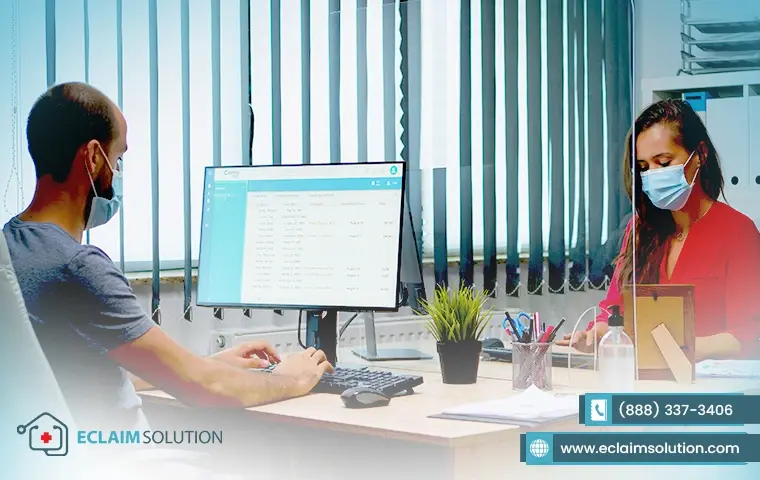
How AI Is Redefining the Future of Billing Automation
The healthcare industry prioritizes data entry accuracy, reducing the administrative burden and enhancing revenue. Staff following traditional billing spend long hours on manual input, correcting errors, and chasing approvals.
Medical billing automation has resolved the issue of manual processes, preventing revenue loss and missed deadlines. AI is revolutionizing healthcare billing services to reduce mistakes and claim denials, increase ROI, and improve patient experience. The rise in AI and automation in healthcare is improving accuracy, efficiency, and cost savings.
Billing in healthcare is complicated, but AI is transforming the healthcare cash flow improvement procedure and reducing billing errors. Curious to know how AI is evolving the landscape of healthcare billing? This blog will explain AI’s role in billing, predictive analytics, revenue cycle, common challenges, and the future of AI billing.
What Is the Role of AI in Billing Automation?
AI plays a massive role in billing automation. Significant technologies like Natural Language Processing and Machine Learning improve data entry, payment flow, and approvals. The following are the crucial roles of AI in billing automation.
Automate Coding
AI algorithms analyze medical treatment and clinical records to assign the correct codes for documentation completion. This speeds up the coding process and increases healthcare cash flow.
Error Detection
AI identifies and reduces errors, misinformation, and billing or patient record duplication. Error detection and correction minimize claim denials and revenue loss before claim submission.
Instant Verification
AI tools in healthcare verify patients’ personal and insurance data to confirm their details, insurance coverage, and eligibility. It ensures accurate information and prevents costly errors.
Predictive Analytics
AI reviews the historical data to analyze the risk claims, predict billing issues, and future revenue trends. Providers can easily take preventive measures to avoid loss.
Fraud Detection
An advanced AI algorithm detects patterns and analyzes fraudulent activities in healthcare billing. Medical billing automation can ensure compliance and avoid fraudulent claims.
Reminder: Looking to simplify your healthcare billing services? Contact us today
Impact of AI for Predictive Denial Management in Billing
Denial management in healthcare billing is directly connected to the provider’s financial stability. Healthcare providers face claim denials due to errors, verification issues, or miscommunication. Manual denial management is also struggling, while AI detects errors, identifies potential problems, and processes claims. Here are the impacts of AI for predictive denial management in billing.
01. Increase Claim Efficiency
Billing errors can lead to claim denials and reimbursement delays. AI plays a crucial role and automates claim scrubbing to identify and correct errors. The automated data entry process prevents errors in patient information and billing codes. Identifying mistakes before submission can reduce the denial rate and improve revenue cycle efficiency.
02. Prevent Future Denials
Predictive analysis of AI can improve denial management and help providers take measures for future denials. AI analyzes historical data to provide future trends and reveal systematic issues for targeted changes. Providers can use predictive data for staff training to adjust workflows and reduce denials.
03. Optimize Workflow
AI automates routine tasks to improve the efficiency of denial management. Optimizing workflow helps providers manage claim denials and resolve issues faster. AI integration automates routine tasks to allow staff to identify complex problems. Collaboration between departments and staff in healthcare billing automation helps solve denials faster.
04. Enhance AI-Driven Decision Making
AI provides data-driven insights for providers to make informed and strategic decisions. These insights help manage denials and lead to better outcomes. The AI system delivers deep insights into the reasons for denials and operational weaknesses to address specific issues. Real-time alert option is also present to notify providers of problems and allow them to resolve them before time.
How AI Boosts Revenue Cycle Process
The revenue cycle process faces coding complexities, claim denials, billing errors, and reimbursement delays. These issues can lead to financial loss, delays, frustrations, and poor patient care. The following are the factors of how AI is enhancing the revenue cycle process.
1. Automates Administrative Tasks
Integrating AI means automating all the manual tasks to validate healthcare billing automation. AI-driven systems streamline the coding workflow, ease the billing process, and reduce errors. Automation of the billing task will speed up the revenue cycle flow and reduce inefficiencies.
2. Improve Claim Accuracy
AI can analyze and detect errors in coding, patient information, documentation, denials, and repetitive tasks. Billing errors and claim denials will automatically be reduced. AI’s impact enables smooth revenue flow and faster reimbursements.
3. Optimize Revenue Prediction
Predictive analysis of AI reviews historical data to predict and prevent obstacles to efficient and faster revenue collection. The analysis approach of the AI helps in strategic planning and resource allocation to support the financial stability of the provider.
4. Patient AI-Driven Communication
AI-powered platforms provide virtual assistants and chatbots to communicate with patients, discuss transparent billing information, and promote compliance. Patient engagements and timely responses can build trust, speed up payments, reduce delays, and improve customer satisfaction.
Common Challenges for Integration in Billing Automation
The healthcare industry is facing errors, claim denials, and reimbursement delays. The rise of automated billing systems has led providers to shift towards AI solutions. Moving towards AI in billing automation can lead to many integration challenges. Here are some common integration challenges you may face.
1. Fragmented and Non-Standardized Systems
Many hospitals and clinics use multiple software systems that are not connected, which creates inefficiencies. Providers should implement interoperable technology to exchange data seamlessly.
2. Security and Privacy Risks
Automated billing software integration can be a risk of data breaches and cyber attacks to patients’ sensitive information. Ensure HIPAA compliance and incorporate strong security measures to protect data.
3. High Costs and Complexity
When changing an existing system, the upfront cost of integration and complexities can be a major challenge. Before scaling, automation must analyze a project’s ROI.
4. Staff Resistance and Skills Gaps
Staff members may resist using the new software, and hospitals must hire a skilled person to manage the software. Providing training and help in adopting a new system can solve the issue.
5. Regulatory Compliance
Federal, state, and local regulations continuously evolve and add challenges to billing automation. Stay updated with regulatory changes to meet future compliance.
The Future of Automated Healthcare Billing Solutions
Adoption of AI-driven billing automation has transformed the techniques and met the goals of the healthcare industry. The following are the key trends that are playing a significant role in revolutionizing healthcare.
Automation
Artificial Intelligence and machine learning combined to power the automation and handle tasks from patient registration to payment collection.
Revenue Cycle Management
AI manages the entire revenue cycle management and connects the billing system to the records software for quick data flow and error reduction.
Patient Engagement
AI analyzes patient data and engages with them through a virtual platform to explain financial guidance and offer personalized plans.
Predictive Analytics
AI predictive analytics help providers with future trends, identify issues, and enhance RCM for better financial stability.
Blockchain Integration
Blockchain implementation in billing software can improve the accuracy and security of the data.
Conclusion
AI has a significant role in evolving the healthcare billing process. Through automation and process fix Revenue Cycle Management, organizations can achieve better process automation, improved accuracy, and enhanced revenue cycles in AI-driven billing. Advancements in error detection, predictive analysis, and fraud prevention further reduce claim denials, boost operational efficiency, and streamline the medical billing process.
Integrating AI also led to challenges like security, high costs, and skills gaps. The future of AI-driven billing will ensure more accurate and efficient outcomes. AI is vital for healthcare providers who want financial independence and workflow success.
Frequently Asked Questions
An automated billing system in healthcare is software that uses AI, ML, and NLP to streamline the billing process, from patient registration and verification to claim management and payment receipt.
AI in medical billing enhances the efficiency and accuracy of billing operations, optimizes medical coding, identifies errors, and predicts and prevents claim denials for timely reimbursements.
Billing automation finds and corrects manual errors, speeds up the claim process, reduces claim denials, and improves cash flow by optimizing patient verification, automated claim submission, and payment processing.
AI provides data-driven insights, automates tasks, and customizes treatments to help make strategic decisions.
Providers can face these common challenges in medical billing:
- Claim denials and rejection
- Coding and documentation errors
- Regulatory updates and compliance
- Delay reimbursements
- Staff and resources
- Insurance verification issues.
Book a Consultation
Categories
- ╰┈➤ Medical Billing
- ╰┈➤ Specialty Billing
- ╰┈➤ Credentialing
- ╰┈➤ Medical Coding
Comprehensive Healthcare Management Services
